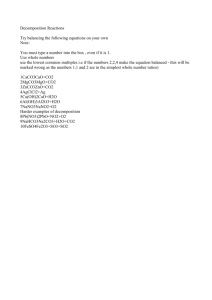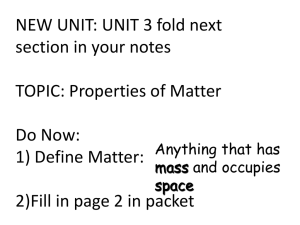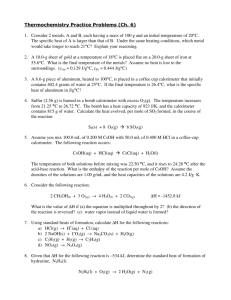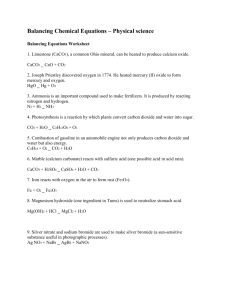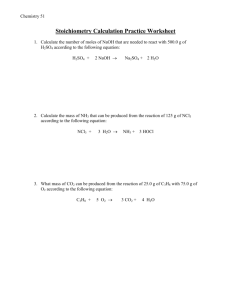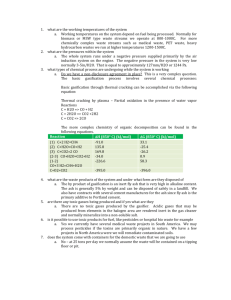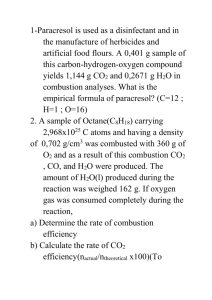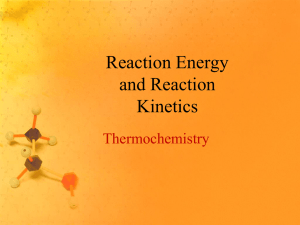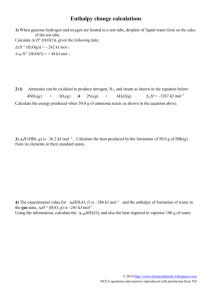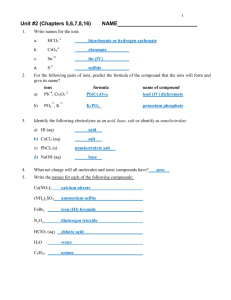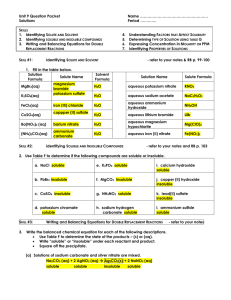solutions
advertisement
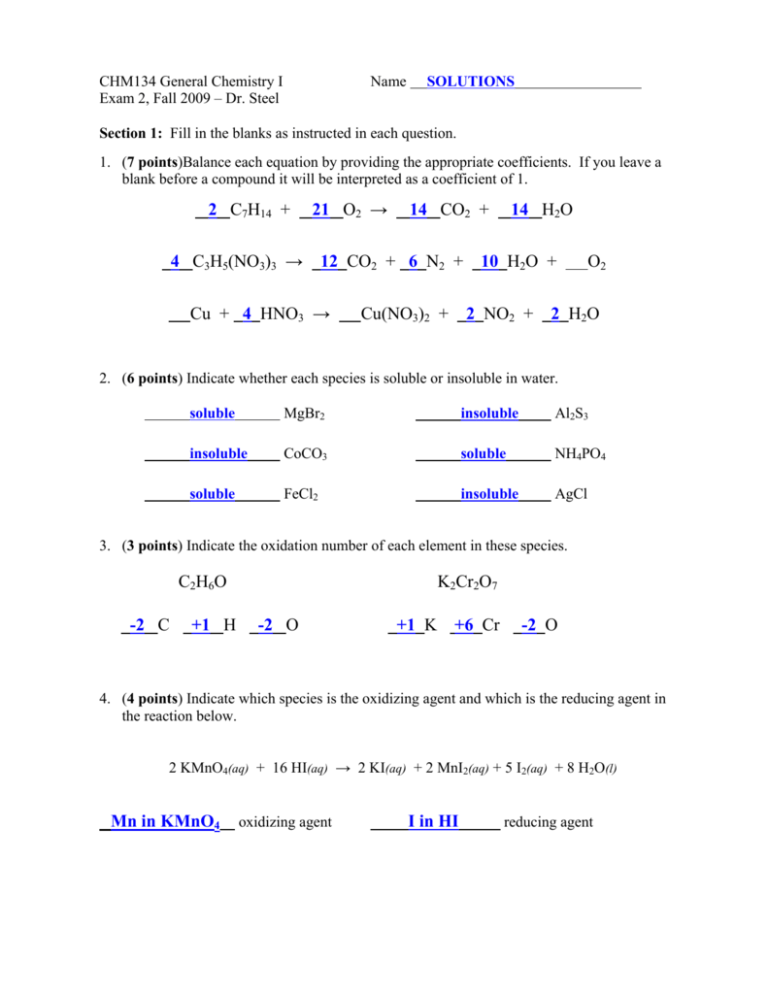
CHM134 General Chemistry I Exam 2, Fall 2009 – Dr. Steel Name SOLUTIONS Section 1: Fill in the blanks as instructed in each question. 1. (7 points)Balance each equation by providing the appropriate coefficients. If you leave a blank before a compound it will be interpreted as a coefficient of 1. 2 C7H14 + 21 O2 → 4 C3H5(NO3)3 → 14 CO2 + 14 H2O 12 CO2 + 6 N2 + 10 H2O + Cu + 4 HNO3 → Cu(NO3)2 + O2 2 NO2 + 2 H2O 2. (6 points) Indicate whether each species is soluble or insoluble in water. soluble MgBr2 insoluble Al2S3 insoluble CoCO3 soluble NH4PO4 soluble FeCl2 insoluble AgCl 3. (3 points) Indicate the oxidation number of each element in these species. C2H6O -2 C +1 H K2Cr2O7 -2 O +1 K +6 Cr -2 O 4. (4 points) Indicate which species is the oxidizing agent and which is the reducing agent in the reaction below. 2 KMnO4(aq) + 16 HI(aq) → 2 KI(aq) + 2 MnI2(aq) + 5 I2(aq) + 8 H2O(l) Mn in KMnO4 oxidizing agent I in HI reducing agent 5. (4 points) Indicate which species is the oxidized and which is reduced in the reaction below. 2 Na2S2O3(aq) + Br2(aq) → Na2S4O6(aq) + 2 NaBr(aq) S in S2O3 oxidized species Br2 reduced species 6. (3 points) Indicate the gas that is most likely to be produced from each reaction. H2S Na2S(aq) + 2 HBr(aq) → ???? NH3 NaOH(aq) + NH4Br(aq) SO2 CaSO3(aq) + H3PO4(aq) → ???? → ???? 7. (10 points) Indicate whether each reaction is a precipitation, acid-base, gas forming, or redox reaction. Precipitation HBr(aq) + AgNO3(aq) → HNO3(aq) + AgBr(s) Gas Forming 2 HCl(aq) + Na2CO3(s) → 2 NaCl(aq) + H2O(l) + CO2(g) Redox KI(aq) + HClO(aq) → KCl(aq) + HIO(aq) Acid-base LiOH(aq) + HCl(aq) → H2O(l) + LiCl(aq) Redox 2 C2H2(g) + 5 O2(g) → 4 CO2(g) + 2 H2O(g) Section 2: Complete each question. You must show your work in order to earn full credit. 8. (9 points) What mass of chromium reacts completely with 17.8 grams of oxygen according to the following balanced equation? 3 O2(g) + 4 Cr(s) → 2 Cr2O3(s) 17.8 1 32.00 4 3 52.00 1 38.6 9. (12 points) Sulfuric acid will dissolve aluminum metal. How many moles of hydrogen gas can be made from the reaction of 3.80 mol aluminum with 4.25 mol H2SO4? How many moles of the excess reactant will be leftover? 2 Al(s) + 3 H2SO4(aq) → Al2(SO4)3(aq) + 3 H2(g) 3 2 3.80 5.70 3 4.25 3 4.25 Therefore, only 4.25 moles of H2 will be produced. The limiting reactant is the H2SO4, thus 2 4.25 3.80 3 2.83 0.97 2.83 will be leftover. 10. (8 points) How can I prepare 100. mL of a solution of lithium carbonate (LiCO3, MW = 66.96 g/mol) in water such that it has a concentration of 2.50 M? Please be specific. 2.50 0.250 66.96 1 0.100 0.250 16.74 Thus, you should dissolve 16.74 g of LiCO3 in enough water to make exactly 100. mL of solution. This would be best done in a 100-mL volumetric flask. 11. (12 points) The balanced equation for the combustion of octane appears below. If an average car converts octane to CO2 and water with a typical percent yield of 88.4%, how many gallons of octane are consumed by a car that annually emits 5.20×103 kg of CO2? 1 gallon = 3.7854 L, the density of octane is 0.703 g/mL 2 C8H18(g) + 25 O2(g) → 18 H2O(s) + 16 CO2(g) First, take into account the percent yield: 0.884 5200 5200 0.884 5882 Now find the mass of octane used: 5882 1000 1 1 44.01 2 16 1.91 114.22 1 10 2.71 0.703 2.71 1 1000 10 1 3.7854 1.91 10 10 717 12. (12 points) Fructose is a common sugar found in fruit. Elemental analysis of fructose gave the following mass percent composition: C 40.00%, H 6.72%, O 53.28%. The molar mass of fructose is 180.16 g/mol. Find the molecular formula of fructose. 40.00 1 12.01 3.33 3.33 1 6.72 1 1.008 6.67 3.33 2 3.33 3.33 1 53.28 1 16.00 The empirical formula is CH2O Divide the molar mass by the empirical mass and scale up: 180.16 / 30.03 / 6 Thus, the molecular formula is C6H12O6. 13. (10 points) A sugar cube has a mass of 1.157 g of sucrose (C12H22O11). How many atoms of oxygen are in the cube? 1.157 11 1 1 342.30 6.022 10 1 2.239 10 Bonus: Circle and identify any functional groups (other than alkanes) in the structures below. O OH carboxylic acid alkene O ketone OH alkyne NH2 amine alcohol
